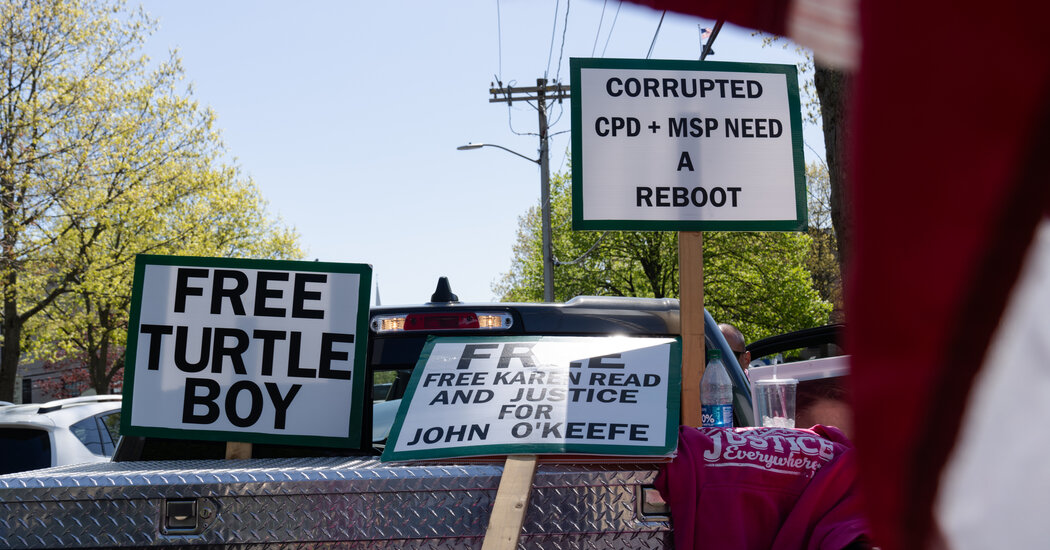In the early hours of Jan. 29, 2022, as a snowstorm raged, a 46-year-old Boston police officer, John O’Keefe, was discovered unresponsive outside the home of a fellow officer in Canton, Mass.
He was found by his girlfriend, Karen Read, who said she had frantically searched for him after waking up on his couch around 4 a.m. and realizing he had not come home from a night out. Officer O’Keefe had severe head injuries and hypothermia and was pronounced dead that morning. Ms. Read was arrested three days later, and the case has transfixed Boston ever since.
Ms. Read, 44, is now on trial in a Massachusetts courtroom, accused of killing Officer O’Keefe by backing into him with her sport utility vehicle after an argument and then leaving the scene. Her lawyers, along with a vocal and devoted squad of defenders, say she is innocent, alleging a sweeping conspiracy and cover-up by law enforcement officials to hide the truth about the murder.
Public fascination with the case has been fueled by an unusual confluence of factors: the relative rarity of a woman accused of murder; the mysterious circumstances of the death; the small-town setting and the web of relationships connecting the key players; and the magnetic appeal of conspiracy theories to those inclined to mistrust the police and the government.
“Any one of those things would get attention, but when you add them all up, there is a fascination,” said Daniel Medwed, a professor of law and criminal justice at Northeastern University. “We’re all like rubberneckers, watching for the next bombshell.”
“People want to know — is she a calculating killer or a damsel in distress?” he added.
The passions that swirl around the case have led to one startling twist after the next: a blogger charged with harassing witnesses for the prosecution. A district attorney rebuking conspiracy theorists. A judge ordering pro-Read demonstrators to stay 200 feet from the courthouse — and banning from the courtroom any clothing with slogans related to the case.
A few facts are undisputed. Ms. Read and Officer O’Keefe, who had dated years earlier and had reconnected during the pandemic, went out drinking with friends in Canton, a town of 24,000 about 20 miles south of Boston, the night Officer O’Keefe died. At a bar downtown, they ran into Brian Albert, a Boston police sergeant detective who also lived there, and received an invitation to join a group of friends for late-night drinks at his home.
Shortly after midnight, they drove to the residence, in a hilly neighborhood of well-kept homes. Officer O’Keefe got out of Ms. Read’s black Lexus S.U.V. Prosecutors say that they had been fighting and that Ms. Read had then accelerated in reverse, intentionally striking her boyfriend before leaving.
In court filings, prosecutors have described damage to the rear end of Ms. Read’s S.U.V., enraged voicemails that she left on Officer O’Keefe’s phone that night and statements from witnesses that he had told her he wanted to end the relationship.
Most damning, some of the emergency workers called to the scene that morning have testified that they heard Ms. Read say repeatedly, “I hit him.”
Ms. Read denies harming Officer O’Keefe; she has pleaded not guilty to charges of manslaughter and second-degree murder. She has suggested that in her shock and grief that morning, she uttered a panicked question — “Did I hit him?” — not a confession.
Her lawyers have advanced an alternate explanation for Officer O’Keefe’s death: that he went inside Sergeant Detective Albert’s home, where someone fatally beat him and then dumped his body in the snow.
Those who believe Ms. Read is innocent say the evidence is rife with inconsistencies, indicating a cover-up to protect the people who were in the Albert home that night, most of them related to the Alberts.
The lacerations on Officer O’Keefe’s arm appear unlikely to have been caused by a car, they argue, but resemble bites that might have been inflicted by the homeowner’s German shepherd. Prosecutors say no canine DNA was found on the body.
Defenders of Ms. Read also question why several pieces of red plastic, said to be shards of a broken taillight on her S.U.V., were not found in an initial search of the area around Officer O’Keefe’s body, but turned up hours later, after heavy snowfall had made the yard more difficult to search.
Most suspicious, they say, is a Google search, including a misspelled word, that was recovered from the cellphone of a woman who was inside the Albert home that night: “hos long to die in cold.” The defense says the query was made around 2:30 a.m., before the body was found. Prosecutors say it happened hours later, at Ms. Read’s frantic request, just after she had discovered her boyfriend unresponsive, but was typed into a search tab that had been left open since 2:30, resulting in a misleading time stamp.
Not content to keep their outrage to themselves, some members of the “Free Karen Read” movement have taken their protest on the road, hoisting signs with slogans including “Cars Don’t Bite” — a reference to the marks found on the victim’s arm — and “Justice for John O’Keefe” at malls and intersections from Boston to Cape Cod. And they have made a steady stream of $5, $10 and $25 donations to an online fund-raiser for her legal defense.
“When you know in your heart that you’re right, nothing else matters,” said Tom Derosier, a supporter of Ms. Read who protests outside the Norfolk County courthouse in Dedham whenever the trial, which began two weeks ago, is in session.
Many of her supporters dress in pink; several have purchased matching hot pink sneakers for their hours standing on the sidewalk. One recent morning, a group sat in beach chairs near the courthouse, listening to live audio of the testimony next to a buffet of Dunkin’ doughnuts and coffee.
“He’s lying through his teeth,” one woman mumbled to no one in particular as she listened to a witness for the prosecution while nibbling a Munchkin.
Jessica Finch-Reid, a mother of three from Taunton, said she brings her home-schooled 16-year-old daughter to the protests to learn real-life lessons about the criminal justice system.
“Karen Read could be any one of us,” she said.
Ms. Read, who worked at an investment firm before her arrest, told ABC News last summer that she had admired Officer O’Keefe for taking in his young niece and nephew after the deaths of his sister and her husband. As their relationship progressed, she said in the interview, she spent more time at his home, helping care for the children.
But she had accused Officer O’Keefe of cheating on her not long before he died, and he had told her that their relationship had “run its course,” witnesses told investigators. Ms. Read drank heavily the night that Officer Keefe died and told friends she could not remember driving to the Albert home, according to court filings from the prosecution.
The unusual degree of public suspicion around the prosecution — fueled in part by a popular and controversial Boston blogger known as Turtleboy who has relentlessly proclaimed her innocence — seems to have riled prosecutors. Last summer, Michael W. Morrissey, the district attorney leading the case, issued a video rebuttal to conspiracy theorists, saying they had harassed witnesses.
“It should be an outrage to any decent person, and it needs to stop,” Mr. Morrissey said. “Innuendo is not evidence.”
The blogger, Aidan Kearney, was charged in October with harassing and intimidating witnesses; he has pleaded not guilty. On his website, trial-themed apparel for sale includes a $27 tank top emblazoned with the Google logo and the words “hos long to die in cold.”
The federal authorities have also stepped in, conducting a highly unusual pretrial review of the local investigation, calling witnesses before a federal grand jury and consulting their own experts. Their findings have not been made public.
Overlooked in the uproar, some say, is the loss of Officer O’Keefe, and his family’s grief. The larger and louder the protests, “the more it seemed as though John’s legacy was falling into obscurity,” a longtime friend wrote recently in Boston magazine.
In Facebook groups where thousands of Ms. Read’s defenders analyze the evidence and dissect the court testimony daily, a few have dared to share their growing doubts that she was framed.
“I was initially open to the conspiracy theory, but to have not one person crack is leading me to think Karen likely hit him,” one posted on Thursday. “The simple story is usually the most likely story.”
Another commenter expressed a blunter skepticism, echoing the misspelled Google search but leaving it unclear which side he favored: “Hos long before people stop with these idiotic takes?”




